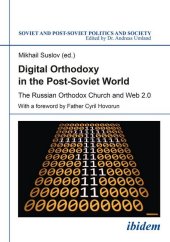 Neuerscheinungen 2016Stand: 2020-02-01 |
Schnellsuche
ISBN/Stichwort/Autor
|
Herderstraße 10
10625 Berlin
Tel.: 030 315 714 16
Fax 030 315 714 14
info@buchspektrum.de |

Magda Dolinska-Rydzek, Ekaterina Grishaeva, Fabian Heffermehl, Cyril Hovorum, Alexander Ponomariov, Hanna Stähle, Mikhail Suslov, Andreas Umland
(Beteiligte)
Digital Orthodoxy in the Post-Soviet World
The Russian Orthodox Church and Web 2.0
Herausgegeben von Umland, Andreas; Suslov, Mikhail; Mitarbeit: Hovorum, Cyril; Suslov, Mikhail; Dolinska-Rydzek, Magda; Heffermehl, Fabian; Ponomariov, Alexander; Grishaeva, Ekaterina
2016. 352 S. 210 mm
Verlag/Jahr: IBIDEM 2016
ISBN: 3-8382-0871-4 (3838208714)
Neue ISBN: 978-3-8382-0871-8 (9783838208718)
Preis und Lieferzeit: Bitte klicken
This volume explores the relationship between new media and religion, focusing on the WWW´s impact on the Russian Orthodox Church.
Eastern Christianity has travelled a long way through the centuries, amassing the intellectual riches of many generations of theologians and shaping the cultures as well as histories of many countries, Russia included, before the arrival of the digital era. New media pose questions that, when answered, fundamentally change various aspects of religious practice and thinking as well as challenge numerous traditional dogmata of Orthodox theology. For example, an Orthodox believer may now enter a virtual chapel, light a candle by drag-and-drop operations, send an online prayer request, or worship virtual icons and relics. In recent years, however, Church leaders and public figures have become increasingly skeptical about new media. The internet, some of them argue, breaches Russia´s ?spiritual sovereignty? and implants values and ideas alien to the Russian culture.
This collection addresses such questions as: How is the Orthodox ecclesiology influenced by its new digital environment? What is the role of clerics in the Russian WWW? How is the specifically Orthodox notion of sobornost´ (catholicity) being transformed here? Can Orthodox activity in the internet be counted as authentic religious practice? How does the virtual religious life intersect with religious experience in the ?real? church?
"An interesting piece of work which addresses an important and obviously under-researched topic." Prof Dr Thomas Bremer, Westfälische Wilhelms-Universität Münster
Dr. Mikhail Suslov holds a PhD in history from the European University Institute (Florence). Now he is a Marie Curie fellow at Uppsala University´s Center for Russian and Eurasian Studies at the Uppsala University. His academic interests include Russian intellectual history, geopolitical ideologies and utopias, religious (Orthodox) political theorization. His most recent publications are: Suslov (2014). "Holy Rus": The Geopolitical Imagination in the Contemporary Russian Orthodox Church. Russian Politics & Law, 52(3); Suslov (2014). "Crimea Is Ours!" Russian popular geopolitics in the new media age. Eurasian Geography and Economics, 55(6). The author of the foreword: Fr. Cyril Hovorun is a priest of the Russian Orthodox Church (Moscow Patriarchate); currently a senior lecturer at Stockholm School of Theology / Sankt Ignatios Academy in Sweden and a researcher at Columbia University.


